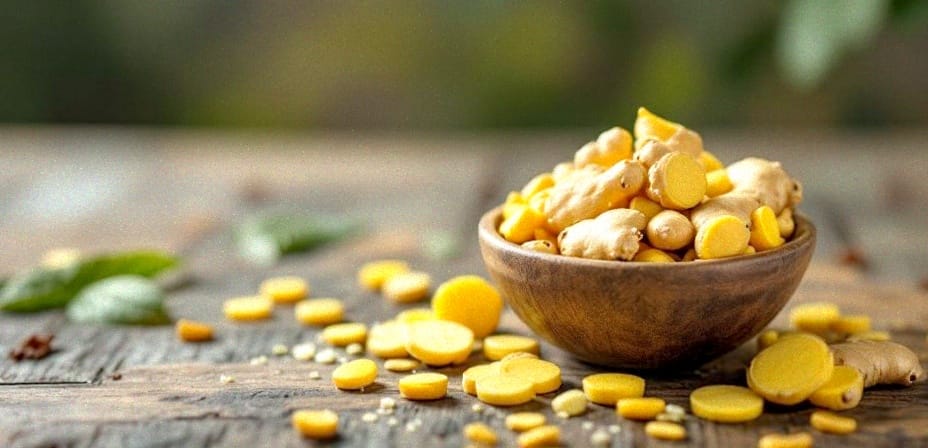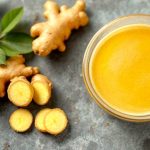Your cart is currently empty!
Takeaways:
- Ginger contains compounds that may help alleviate depression symptoms
- Regular consumption of ginger might improve mood and cognitive function
- Ginger can be easily incorporated into daily diets through food and supplements
- Combining ginger with lifestyle changes may enhance its potential benefits
- More research is needed to fully understand ginger’s effects on depression
Understanding Ginger and Depression
Ginger, a widely used spice, is being investigated for its possible benefits to mental health. This root, recognized for its distinct taste and smell, might have more to offer than just flavor. Current research suggests ginger may help lessen the symptoms of depression.
Depression affects millions worldwide, impacting daily life and overall health. It involves more than just sadness; it often includes a consistent low mood, disinterest in activities, and physical symptoms. As people look for natural options instead of standard treatments, ginger has become a potentially helpful alternative.
The link between ginger and improved mood is believed to stem from its many active compounds. These substances interact with the body, and may affect brain chemistry and inflammation, both of which can relate to depression.
The Science Behind Ginger’s Effects
Chemical Composition
Ginger’s potential lies in its complex mix of chemicals. While the root contains over 400 different compounds, some are thought to have mood-boosting properties.
| Compound | Potential Benefit |
|---|---|
| Gingerols | Anti-inflammatory, antioxidant |
| Shogaols | Neuroprotective, anti-inflammatory |
| Zingerone | Antioxidant, anti-inflammatory |
| Paradols | Anti-inflammatory |
These compounds work in combination, creating a synergistic effect that could lead to ginger’s potential as an aid for depression. When consumed, they are absorbed into the bloodstream and can reach the brain, directly influencing the nervous system.
Neurochemical Impact
How ginger affects brain chemistry is a key focus of current studies. Research suggests it may interact with several neurotransmitters that play a role in regulating mood:
- Serotonin
- Dopamine
- Norepinephrine
By influencing these neurotransmitters, ginger might help balance mood and emotions. Its anti-inflammatory effects are also important. Ongoing inflammation is linked to depression, and ginger’s ability to reduce inflammation may indirectly improve mental health1.
Ginger’s Potential Benefits for Depression
Mood Enhancement
Consuming ginger may lead to general mood improvement. Regular intake has been associated with decreased feelings of sadness and worry in some studies. This could be due to ginger’s effects on neurotransmitter levels and its ability to reduce inflammation.
The compound 6-shogaol, found in ginger, has shown antidepressant-like effects in animal studies. It might help raise levels of serotonin and norepinephrine in the brain, similar to some antidepressant medications2.
Cognitive Function
Depression often impacts thinking skills, such as memory and focus. Ginger might help with these problems. Some research suggests ginger can improve cognitive function and memory, especially in middle-aged women3.
Improved cognitive function can positively affect overall mental health. When people can think more clearly and remember things better, they often feel more in control and positive. This improvement in thinking may help manage depression symptoms.
Physical Symptoms
Depression isn’t just a mental state; it often has physical symptoms as well. Common physical symptoms include tiredness, changes in appetite, and difficulty sleeping. Ginger might help reduce some of these symptoms.
- Reduces inflammation in the body
- Improves digestion and appetite
- May enhance sleep quality
- Boosts energy levels
- Alleviates muscle tension and pain
By addressing some physical aspects of depression, ginger may indirectly improve overall mood and well-being.
Incorporating Ginger into Your Diet
Dietary Sources
Adding ginger to your diet can be simple and tasty. Many common foods and drinks include ginger:
- Fresh ginger root
- Ginger tea
- Ginger ale (look for versions with real ginger)
- Gingerbread
- Asian cuisine (stir-fries, curries)
For the best potential mental health benefits, fresh or minimally processed ginger is recommended. These forms retain more of the beneficial compounds that may help with depression symptoms.
Supplements
If dietary sources are not sufficient, ginger supplements are another option. They are available in different forms:
| Form | Pros | Cons |
|---|---|---|
| Capsules | Convenient, no taste | May contain fillers |
| Powders | Versatile, can be added to food/drinks | Strong taste |
| Oils | Concentrated, small doses needed | Can be expensive |
When choosing a supplement, look for high-quality products from trusted companies. Always consult with a doctor before starting any new supplement, particularly if you are taking medications.
Dosage and Safety
Recommended Intake
The ideal ginger dosage for alleviating depression is not yet clearly defined. However, general guidelines suggest:
- Fresh ginger root: 1-2 grams daily
- Dried ginger powder: 1-3 grams daily
- Ginger tea: 1-2 cups daily
These amounts are generally considered safe for most adults. However, individual needs may vary depending on factors such as age, overall health, and any medications being taken.
Potential Side Effects
While ginger is typically safe, some people may have side effects:
- Mild digestive discomfort
- Heartburn
- Diarrhea
- Mouth irritation
People with certain health conditions should use ginger cautiously:
- Bleeding disorders
- Diabetes
- Heart conditions
- Pregnancy (consult a doctor first)
Ginger can interact with some medications, especially blood thinners and drugs for diabetes. Always inform your doctor about any supplements you are taking.
Ginger vs. Traditional Antidepressants
Effectiveness Comparison
Comparing ginger to traditional antidepressants is difficult. Standard medications have been extensively studied, while research on ginger for depression is still in its early stages.
Antidepressants typically target specific brain chemicals called neurotransmitters. Ginger’s effects may be broader, possibly affecting multiple systems in the body. This overall approach could be helpful, but more research is needed to understand how well it works.
Some studies suggest ginger might enhance the effects of antidepressants when used together. However, this combination should only be done with a doctor’s guidance.
Natural vs. Pharmaceutical
Ginger, as a natural option, is appealing to those seeking alternatives to prescription drugs. It may have fewer side effects than some antidepressants. However, it is important to remember that “natural” does not always mean safe or effective for everyone.
| Aspect | Ginger | Antidepressants |
|---|---|---|
| Origin | Natural | Synthetic |
| Side Effects | Generally mild | Can be significant |
| Effectiveness | Needs more research | Well-established |
| Onset of Action | May be gradual | Often takes weeks |
| Regulation | Less regulated | Strictly controlled |
The decision between natural options like ginger and prescription antidepressants should be made in consultation with a doctor. Each person’s situation is unique, and what works for one may not work for another.
Lifestyle Factors
Diet and Nutrition
A balanced diet is very important for managing depression. Not having enough of the right nutrients can make symptoms worse, while a healthy diet supports overall mental health.
Ginger can easily fit into a healthy diet. It can be added to various dishes, improving both flavor and potential health benefits. Some nutritionists recommend combining ginger with other foods known to promote mental health:
- Fatty fish (rich in omega-3s)
- Dark leafy greens (high in folate)
- Berries (packed with antioxidants)
- Nuts and seeds (good sources of selenium and zinc)
It’s important to remember that no single food can cure depression. Ginger should be part of a varied, nutrient-rich diet for the most benefits.
Exercise and Physical Activity
Exercise is a useful tool in managing depression. It releases endorphins, improves sleep, and boosts self-esteem. Combining regular exercise with ginger intake might improve the benefits of both.
- Start with gentle exercises like walking or yoga
- Gradually increase intensity and duration
- Try to exercise outdoors for added mood benefits
- Consider post-workout ginger tea for inflammation reduction
- Stay consistent with both exercise and ginger intake
The combination of exercise and ginger could potentially enhance mood-boosting effects. However, it’s important to find an exercise routine that you enjoy and can maintain over time.
Research and Studies
Current Findings
Recent studies on ginger and depression show promising results. A 2020 review in the journal “Food Science & Nutrition” highlighted ginger’s potential as an aid for depression4. The review noted ginger’s ability to affect brain chemicals and reduce inflammation as possible ways it works.
Another study in “Phytotherapy Research” found that ginger extract had effects similar to antidepressants in mice5. The researchers noticed changes in serotonin levels similar to those caused by antidepressant medications.
Human studies are still limited, but a small study in 2016 showed that ginger supplements reduced markers of inflammation in people with depression6. This supports the theory that ginger’s anti-inflammatory properties may contribute to its mood-enhancing effects.
Future Directions
While current research is encouraging, more detailed studies are needed. Future research should focus on:
- Larger, long-term human trials
- Optimal dosage for depression relief
- Potential interactions with antidepressant medications
- Comparison studies with established treatments
- Mechanisms of action in the brain
As interest in natural options increases, more research into ginger’s effects on mental health is expected. This could lead to a better understanding and possibly new treatment options for depression.
Cultural Perspectives
Traditional Uses
Ginger has been used for centuries in many cultures to promote wellness. In traditional Chinese medicine, it is thought to warm the body and lift spirits. Ayurvedic practices in India have long used ginger to balance emotions and increase energy.
These traditional uses seem to align with modern research. The ancient practice of using ginger for mood enhancement appears to have scientific support. This combination of traditional knowledge and modern science highlights ginger’s potential as a complete approach to mental health.
Global Adoption
Interest in ginger as a natural aid for depression is growing worldwide. Different cultures are incorporating it into their mental health approaches in unique ways:
- In Japan, ginger baths are popular for relaxation and mood improvement
- Middle Eastern countries often use ginger in teas and desserts for its uplifting properties
- Western health food stores now stock a wide variety of ginger products
This global adoption reflects a broader trend towards natural, complete health solutions. As more people seek alternatives to standard treatments, ginger’s role in mental health may continue to grow.
FAQ
These questions reflect common concerns about using ginger for depression. While ginger shows promise, it’s important to view it as part of a larger approach to managing mental health. Always consult with a doctor for personalized advice. Ginger provides a natural, easily accessible option for those looking to support their mental health. Its potential to reduce depression symptoms, along with its long history of traditional use, makes it an interesting topic for both researchers and people seeking complete approaches to wellness. As we’ve seen, ginger’s complex chemical makeup may affect brain chemistry and reduce inflammation, potentially addressing both the mental and physical aspects of depression. It’s also easy to add to daily diets, through foods or supplements, which makes it more appealing. However, it is crucial to remember that ginger is not a replacement for professional medical care. Depression is a serious condition that often requires thorough treatment. Ginger should be seen as a possible complement to established therapies, not a stand-alone solution. The growing amount of research on ginger’s effects on mental health is encouraging, but more studies are needed to fully understand its potential. As interest in natural options continues to increase, we can expect to see more attention given to ginger and other plant-based approaches to mental health care. For those considering ginger as part of their plan for managing depression, it’s important to consult with healthcare providers. They can offer advice on safe usage, potential interactions with medications, and how best to add ginger into an overall treatment plan. Ultimately, managing depression is a personal process that often requires a multi-faceted approach. Ginger, with its potential mood-improving properties and minimal side effects, could be a helpful tool for many people. As research continues, we may learn even more about how this common spice can support mental well-being. Remember, while ginger shows promise, it is just one part of a larger picture. A balanced diet, regular exercise, stress management, and professional support remain fundamental parts of depression treatment. By combining these things with potentially helpful natural options like ginger, people may find a complete approach that works best for their individual needs. As we continue to study the links between nutrition and mental health, ginger stands out as an area that deserves further research. Its potential to connect traditional knowledge with modern science makes it an exciting area of study in the search for natural, effective ways to support mental well-being.Can ginger cure depression?
How long does it take for ginger to improve mood?
Is ginger safe to take with antidepressants?
What form of ginger is best for depression?
Can too much ginger be harmful?
How does ginger compare to St. John’s Wort for depression?
Are there any foods that enhance ginger’s effects on mood?
Can ginger help with seasonal affective disorder?
1. Aryaeian, N., Shahram, F., Mahmoudi, M., Tavakoli, H., Yousefi, B., Arablou, T., & Jafari Karegar, S. (2019). The effect of ginger supplementation on some immunity and inflammation intermediate genes expression in patients with active Rheumatoid Arthritis. Gene, 698, 179-185. https://www.ncbi.nlm.nih.gov/pubmed/30708092
2. Huang, Q., Iwamoto, M., Aoki, S., Tanaka, N., Tajima, K., Yamahara, J., … & Tomimatsu, T. (2011). Anti-5-hydroxytryptamine3 effect of galanolactone, diterpenoid isolated from ginger. Chemical and pharmaceutical bulletin, 59(8), 1024-1026. https://www.jstage.jst.go.jp/article/cpb/59/8/59_8_1024/_article
3. Saenghong, N., Wattanathorn, J., Muchimapura, S., Tongun, T., Piyavhatkul, N., Banchonglikitkul, C., & Kajsongkram, T. (2012). Zingiber officinale Improves Cognitive Function of the Middle-Aged Healthy Women. Evidence-Based Complementary and Alternative Medicine, 2012, 383062. https://www.ncbi.nlm.nih.gov/pmc/articles/PMC3253463/
4. Hashemi, S. A., Yousefi, K., Hajiaghayi, R., Tafazoli, A., Esmati, E., Shams, A., & Sahranavard, S. (2020). Antidepressant and antianxiety effects of ginger: a comprehensive review of human and animal studies. Food Science & Nutrition, 8(12), 6264-6278. https://www.ncbi.nlm.nih.gov/pmc/articles/PMC7700497/
5. Deng, X. Y., Li, H. Y., Chen, J. J., Li, R. P., Qu, R., Fu, Q., & Ma, S. P. (2015). Thymol produces an antidepressant-like effect in a chronic unpredictable mild stress model of depression in mice. Behavioural brain research, 291, 12-19. https://www.sciencedirect.com/science/article/abs/pii/S0166432815300450
6. Mozaffari-Khosravi, H., Talaei, B., Jalali, B. A., Najarzadeh, A., & Mozayan, M. R. (2016). The effect of ginger powder supplementation on insulin resistance and glycemic indices in patients with type 2 diabetes: a randomized, double-blind, placebo-controlled trial. Complementary therapies in medicine, 26, 86-91. https://www.sciencedirect.com/science/article/abs/pii/S0965229916300279
7 Marx, W., McCarthy, A. L., Ried, K., McKavanagh, D., Vitetta, L., Sali, A., … & Isenring, E. (2017). The effect of a standardized ginger extract on chemotherapy-induced nausea-related quality of life in patients undergoing moderately or highly emetogenic chemotherapy: a double blind, randomized, placebo controlled trial. Nutrients, 9(8), 867. https://www.ncbi.nlm.nih.gov/pmc/articles/PMC5579660/
8 Nikkhah Bodagh, M., Maleki, I., & Hekmatdoost, A. (2019). Ginger in gastrointestinal disorders: A systematic review of clinical trials. Food science & nutrition, 7(1), 96-108. https://www.ncbi.nlm.nih.gov/pmc/articles/PMC6341159/
9 Wang, J., Ke, W., Bao, R., Hu, X., & Chen, F. (2017). Beneficial effects of ginger Zingiber officinale Roscoe on obesity and metabolic syndrome: a review. Annals of the New York Academy of Sciences, 1398(1), 83-98. https://nyaspubs.onlinelibrary.wiley.com/doi/full/10.1111/nyas.13375
10 Mashhadi, N. S., Ghiasvand, R., Askari, G., Hariri, M., Darvishi, L., & Mofid, M. R. (2013). Anti-oxidative and anti-inflammatory effects of ginger in health and physical activity: review of current evidence. International journal of preventive medicine, 4(Suppl 1), S36. https://www.ncbi.nlm.nih.gov/pmc/articles/PMC3665023/
11 Lete, I., & Allué, J. (2016). The effectiveness of ginger in the prevention of nausea and vomiting during pregnancy and chemotherapy. Integrative medicine insights, 11, 11-17. https://www.ncbi.nlm.nih.gov/pmc/articles/PMC4818021/
12 Zhu, J., Chen, H., Song, Z., Wang, X., & Sun, Z. (2018). Effects of ginger (Zingiber officinale Roscoe) on type 2 diabetes mellitus and components of the metabolic syndrome: A systematic review and meta-analysis of randomized controlled trials. Evidence-Based Complementary and Alternative Medicine, 2018. https://www.hindawi.com/journals/ecam/2018/5692962/
Last medically reviewed and fact checked on
Colors Nutrition does not provide medical advice, diagnosis, or treatment.




